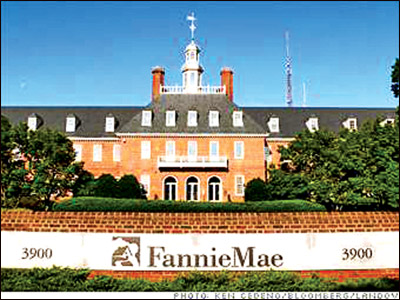US banks stronger
Still need more capital :
*Reforms to financial
rules step in right direction
*Stress tests point to
pockets of weakness
*Housing finance
reform is unfinished business
The United States financial system is stable, but risks remain and
implementing reforms recently signed into law is the next challenge,
according to the IMF’s first detailed assessment of the world’s largest
financial system.
|

Fannie Mac |
The IMF’s report was issued on July 30 under the Financial Sector
Assessment Program, which provides an in-depth analysis of a country’s
financial system and its vulnerabilities. Created in the wake of the
Asian crisis in 1999, over three quarters of the IMF’s 187 member states
have volunteered to undergo an assessment.
The global financial crisis began in the United States with the
meltdown of the sub-prime housing market in 2007, which spilled over
into the US financial sector and spread quickly around the world.
The IMF said reforms to the financial system signed into law in the
Dodd-Frank Act were an important step forward to address the weaknesses
exposed by the global financial crisis.
However, the IMF says that the law missed the opportunity to
streamline the complex web of agencies that oversee banks and other
financial institutions. The legislation establishes a new oversight
council of regulators, who face two significant implementation
challenges:
* Improve the cooperation of US regulatory agencies and enable a more
timely response to emerging systemic risks
* Write the specific rules needed to help contain systemic
vulnerabilities and reverse perceptions that some financial institutions
too big and complex to fail.
The IMF also released a report on its annual check-up of the US
economy, known as the Article IV consultation, which found that the
United States’ economy is recovering, with debt and unemployment the
next challenges.
Key decisions on reforms to the US system of housing finance, and the
mortgage giants Fannie Mae and Freddie Mac, are still pending. The IMF
said the Government’s support for the housing market is costly,
inefficient and complex, with subsidies that do not translate into a
higher homeownership rate.
Given the key role played by the United States’ financial sector in
the global financial system, coordination at the international level
will continue to be important. With US firms linked to many other
countries through cross-border operations and trades, the United States
will need to continue to play a leading role in international crisis
coordination, as well as helping to shape new international rules on
bank supervision and regulation.
The IMF’s assessment of the US financial system included stress
tests, carried out to see how banks and other financial institutions
would fare if economic conditions worsened.
IMF Survey
Magazine |



